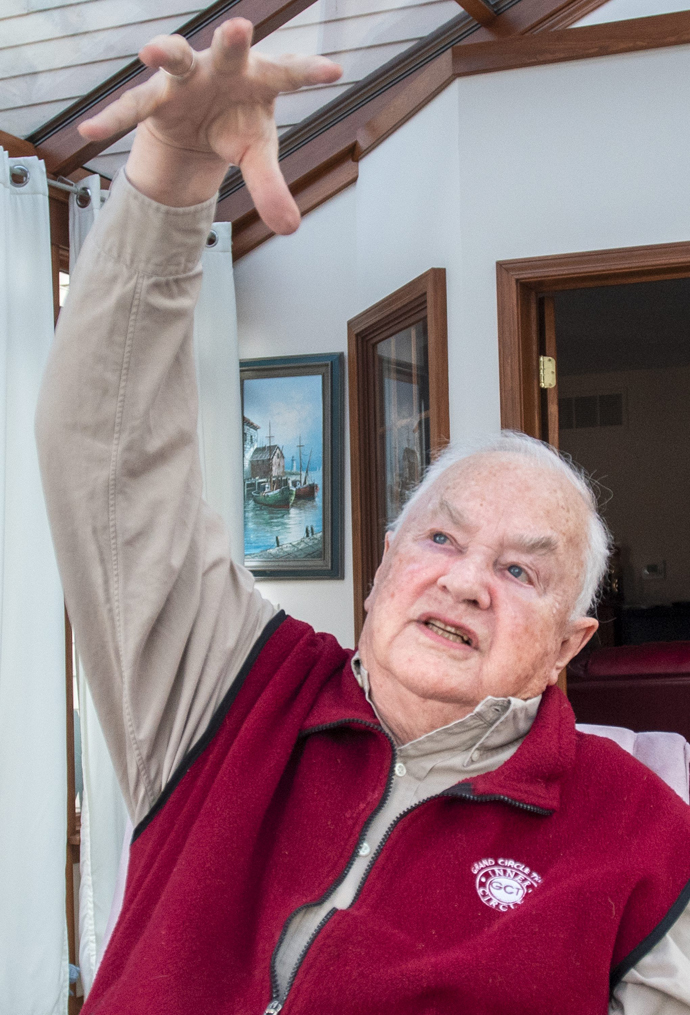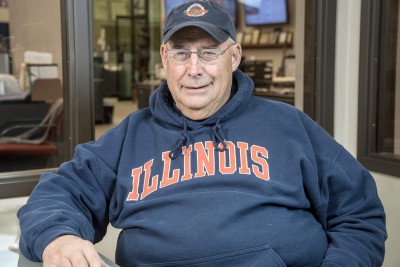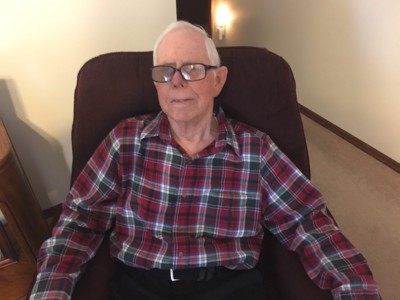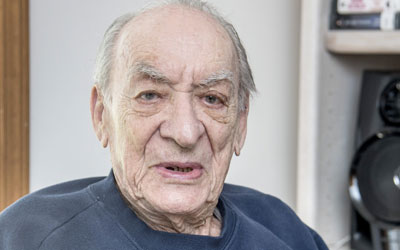Walter McMahon
By Paul Wood

Photo By Robin Scholz/The News-Gazette
CHAMPAIGN — First Lt. Walter McMahon took part in cold, bloody battles in Korea, and left with a Purple Heart — and the scars to show for it.
Later, McMahon taught and researched for about 50 years in the University of Illinois Department of Economics.
A Clinton, Iowa, native, he began college at the University of Iowa, joining the ROTC. While starting work on his master’s, he was called up.
Two 1951 experiences in the famed 3rd Infantry Division stand out especially for McMahon.
One was the uphill assault of Hill 355, which had been taken by Chinese troops.
It got its name for being 355 meters above sea level; soldiers called it Little Gibraltar.
“I was a second lieutenant and had a platoon,” he recalled. “The night before the attack, it was very, very cold, and I had the platoon jog so they didn’t freeze. Then I’d do the same for another platoon.”
By luck of the draw, he had a dangerous mission.
“When we went into attack, I had the lead platoon. As the attack started, there were three soldiers ahead of me, then me, then the rest of my platoon,” followed by other troops.
To minimize running into fire from above, officers called in artillery fire onto the top of the hill. They halted that fire and called in mortars.
They took Hill 355.
“Some of the Chinese had deserted, and some were still there shooting at us,” he said.
“Many had been wounded by the artillery and the mortars, and then some of our soldiers were starting to shoot the wounded. I said I’d court-martial them if they didn’t stop that.”
Taking the hill didn’t mean the action was over.
“Then we began to dig in to prepare for the counter-attack, which always comes,” McMahon said. “The Chinese outnumbered us 10-1 at that point.”
Immediately after that action, he was told to take a sergeant and connect up with the Commonwealth Division of United Nation forces, the British, Australian and New Zealanders.
“They were on our left flank, and we needed to close the gap so the Chinese couldn’t come through during the night,” he said. “I took Dan Williamson, who was my staff sergeant.”
The Chinese were firing at them with mobile artillery.
Eventually, the pair made it to Commonwealth troops.
“At that point, their lieutenant wanted for us to have tea, and we talked about how to close the gap,” he said.
The two soldiers started back as night fell.
“We made a mistake and decided to go through the woods. The Chinese had shells that detonated in the branches of the trees and showered shrapnel down. That unfortunately killed Dan, and I got wounded in the left arm and middle of my back,” McMahon said.
“Very soon, the medics were there. They took us back in a helicopter and flew us to a MASH unit at Yeongdeungpo.”
He was in and out of consciousness.
“I woke on the operating table looking up, and here was Hot Lips right above,” said, smiling.
At 4 a.m., he was loaded onto a plane to Osaka, Japan.
“I was in the hospital there the next six, seven months. Thank goodness the spinal cord wasn’t injured,” he said.
Physical therapy helped with his wounded arm, “and then they made me finance officer for the hospital in charge of payroll.”
He and a Japanese librarian at the hospital became very good friends, and they traveled around Japan.
Now healed, “I expected to be transferred to the intelligence division, but this major said I had enough points to go home.
“The entire time in the hospital, I was earning points as if I was at the front,” he said.
He lectured troops on a variety of subjects at Fort Riley before he was discharged in 1952.
With his wife, Carolyn, he returned to graduate school at the University of Iowa. They also spent a year at the London School of Economics.
McMahon has consulted on the relation of education to growth and development in 22 countries.
He consulted for, among others, the European Development Bank, USAID, the World Bank, UNICEF, The Kuwait Institute of Scientific Research and UNESCO.
That work sent him to Pakistan, Nepal, Indonesia, Thailand, South Korea, Singapore, Kuwait, Malawi and some Latin American countries.
Do you know a veteran who could share a story about military service? Contact Paul Wood at pwood@news-gazette.com.
Read more stories from local veterans:
 Larry Martin
CHAMPAIGN — Master Sgt. Larry Martin was stationed 1,500 meters from the demilitarized zone and North Vietnam in an arti …
Larry Martin
CHAMPAIGN — Master Sgt. Larry Martin was stationed 1,500 meters from the demilitarized zone and North Vietnam in an arti …
 Dick Oliver
CHAMPAIGN — From the Korean War to the Cold War to Vietnam, Dick Oliver kept the planes flying for 20 years. The Air For …
Dick Oliver
CHAMPAIGN — From the Korean War to the Cold War to Vietnam, Dick Oliver kept the planes flying for 20 years. The Air For …
 Alexander Shay
CHAMPAIGN — Born near the end of World War I, Alexander Shay risked death on D-Day in World War II. Shay, who rose quick …
Alexander Shay
CHAMPAIGN — Born near the end of World War I, Alexander Shay risked death on D-Day in World War II. Shay, who rose quick …